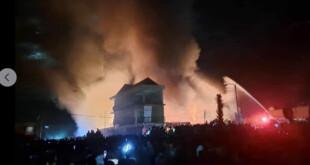U.S. Secretary of State Antony Blinken’s upcoming visit to Addis Ababa, Ethiopia on March 15 to discuss implementation of the peace agreement in northern Ethiopia is an opportunity for the U.S. to raise the issue of the conflict in Oromia and how to implement peace and transitional justice in the southern region as well.
For the past two years, the international community has been riveted by the crisis in the northern Tigray region of Ethiopia. In November 2022, a peace agreement was reached between the Tigray People’s Liberation Front (TPLF) and the Ethiopian government following a series of talks in Pretoria led by the African Union and supported by the United States and others. But a disturbing pattern has begun to emerge over the past two years, wherein, whenever there is a period of relative peace in northern Ethiopia, violence and abuses ramp up inside Oromia.
Since the rise of Prime Minister Abiy to power in 2018, reports of state agents perpetrating extrajudicial killings and drone strikes against civilians in Oromia have been rampant. In July, Human Rights Watch reported that there was a “culture of impunity” for abuses committed by security forces in Oromia. Oromo civilians also routinely face arbitrary arrests and detentions. As recently reported by the Ethiopian Human Rights Commission, civilians are often subjected to further human rights violations once detained, including ill-treatment and the denial of their due process and fair trial rights. It has become a common practice inside Oromia for prison officials to refuse to release detainees, despite a court order for their release.
Unfortunately, state-sanctioned violence is not the only threat facing Oromos and members of other ethnic groups who live in Oromia, as non-state armed actors have also been accused of routinely launching attacks against civilians.
“The hidden war in Oromia has consumed the lives of thousands of civilians over the past three years. Despite its costs, this conflict has continued to be ignored by the international community, even as they have issued countless calls for justice and accountability in the northern part of the country. The Oromo, who account for more than half of Ethiopia’s population, continue to be targeted and face abuses by various groups, particularly State actors who have an obligation to protect them,” said Seenaa Jimjimo, Executive Director for the Oromo Legacy Leadership & Advocacy Association (OLLAA).
World BEYOND War and the Oromo Legacy Leadership and Advocacy Association (OLLAA) have launched petitions calling on the U.S. Congress and the international community to do more to peacefully resolve this crisis. Given the longstanding nature of the Ethiopian government’s efforts to eliminate the Oromo Liberation Army (OLA) militarily, it seems unlikely that the government will be willing to lay aside its arms and enter into a negotiated peace agreement without pressure from the international community. For its part, the international community did not stay silent in the face of brutality during the war in Tigray, and their continued calls for a peaceful resolution to that conflict directly led to a peace deal between the Ethiopian government and the TPLF. World BEYOND War and OLLAA are therefore calling on the international community to respond in a similar fashion to this conflict and to use the diplomatic tools at its disposal to encourage the Ethiopian government to find a similar means to resolve the conflict in Oromia and to ensure the protection of all civilians’ human rights.
“Oromia. The violence is not yet extreme enough, or the U.S. government interest intense enough, for people in the United States to have heard of the place. But the impact of U.S. government policies still means life or death for large numbers of people. The U.S. public allows its government to seek out that sort of impact on the world, and therefore has a responsibility to get informed and get active to control its government. The world public has the same responsibility to act through the United Nations for the at-risk people of Oromia,” said David Swanson, Executive Director of World BEYOND War.
For more information about World BEYOND War and OLLAA’s newly launched campaign, including an in-depth article and radio segment on the current crisis in Oromia, visit worldbeyondwar.org/oromia.




